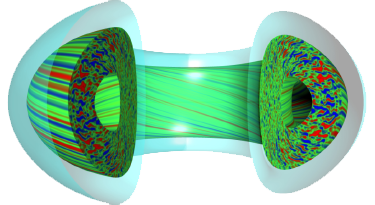Speaker
Description
Fluid based scrape-off layer transport codes such as UEDGE are heavily utilized in tokamak analysis and design, but typically require user-specified anomalous transport coefficients to match experiment. Determining uniqueness of these parameters and the uncertainties in them to match experiments can provide valuable insights to fusion scientists. We leverage recent work in the area of likelihood-free inference (“simulation-based inference”) to train a neural network which enables accurate statistical inference of the anomalous transport coefficients given experimental plasma profile input. UEDGE is treated as a black-box simulator, and run multiple times with anomalous transport coefficients sampled from priors, and the neural network is trained on these simulations to emulate the posterior. The neural network is trained as a normalizing flow model for density estimation, allowing it to accurately represent complicated, high-dimensional distribution functions. We discuss important implementation details such as the use of summary statistics and the number of simulations needed for good results. We also discuss the future possibilities for use of amortized models which train on a wide range of simulations and enable fast statistical inference for results during experiments.
This work is funded through the SciDAC program by the U.S. Department of Energy, Office of Fusion Energy Science and Office of Advanced Scientific Computing Research under contract No. DE-AC02-09CH11466 with Princeton University f
| Country or International Organisation | United States of America |
|---|---|
| Affiliation | Princeton Plasma Physics Laboratory |

